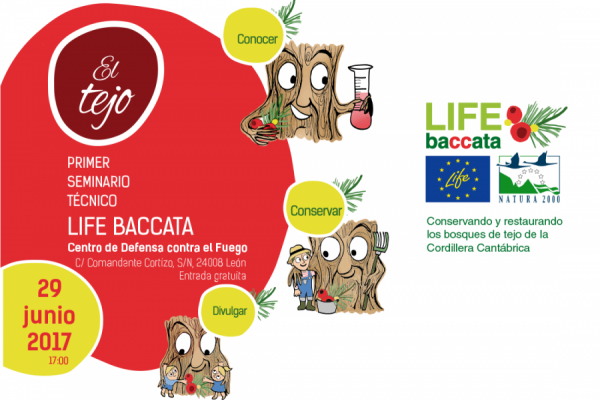LIFE baccata organizes its first Technical Seminar on Cantabrian yew forests
30-06-2017

The organization of this Seminar, in which the Junta de Castilla y León and Cesefor participate, responds to the need to have communication tools as a system of dissemination of information, to promote the transfer of knowledge, as well as to exchange experiences with other working groups with the same objective.
The technical-scientific sessions will be developed basically to ensure that those technical and scientific efforts already developed on the yew, revert in the entities with responsibility for the conservation of this habitat and in particular in the project area.
In these days there will be exchange of valuable experiences with the purpose of knowledge and management of this habitat. In addition, these seminars are intended to continue and strengthen the joint work network that will provide information on previous experiences already made.
The free seminar will be held at the Centro de Defensa contra el Fuego (Center of Defense against Forest Fire) of the capital of León on June 29, 2017. The entrance will be free to cover capacity. Online inscription.
The LIFE BACCATA project works for the conservation and restoration of the priority habitat of the yew currently threatened and in regression, in fifteen places of the Natura 2000 Network of the Cantabrian Mountains that belong to Galicia, Castilla y León, and País Vasco.
The project plans to act on a large area of the Cantabrian Mountain Range, although the study and the results obtained will have an international reach since there are territories in Portugal, France, Italy and Greece that present this type of habitat, similarly threatened.
Yew
Yew has suffered a series of threats that directly affect the biodiversity of the areas it occupies. These threats have appeared over the years and are of various kinds: fires, fellings, construction of infrastructures, fragmentation and lack of connection between these natural spaces or the impact of climate change. Individually or jointly, these threats have endangered the survival of this species, its habitat and the biodiversity they contain, therefore, it is necessary to act and guarantee its future in a sustainable way.
LIFE BACCATA will implement the necessary forest protection and management measures that promote the improvement of the conservation status and restoration of yew and yew forests, promoting their natural regeneration and that of the species of flora and fauna that inhabit them, and will contribute to slow down the biodiversity loss.
The project, co-financed by the European Commission under the LIFE Call, takes place between 2016 and 2020 in fifteen places of the Natura 2000 Network of the Cantabrian Mountains that belong to Galicia, Castilla y León and País Vasco. The University of Santiago de Compostela participates as coordinator of the project and the partners are the Junta de Castilla y León, Cesefor and Hazi, Corporation of the Basque Government for the development of the rural and marine environment.
More information on the project website: www.life-baccata.eu
The technical-scientific sessions will be developed basically to ensure that those technical and scientific efforts already developed on the yew, revert in the entities with responsibility for the conservation of this habitat and in particular in the project area.
In these days there will be exchange of valuable experiences with the purpose of knowledge and management of this habitat. In addition, these seminars are intended to continue and strengthen the joint work network that will provide information on previous experiences already made.
The free seminar will be held at the Centro de Defensa contra el Fuego (Center of Defense against Forest Fire) of the capital of León on June 29, 2017. The entrance will be free to cover capacity. Online inscription.
The LIFE BACCATA project works for the conservation and restoration of the priority habitat of the yew currently threatened and in regression, in fifteen places of the Natura 2000 Network of the Cantabrian Mountains that belong to Galicia, Castilla y León, and País Vasco.
The project plans to act on a large area of the Cantabrian Mountain Range, although the study and the results obtained will have an international reach since there are territories in Portugal, France, Italy and Greece that present this type of habitat, similarly threatened.
Yew
Yew has suffered a series of threats that directly affect the biodiversity of the areas it occupies. These threats have appeared over the years and are of various kinds: fires, fellings, construction of infrastructures, fragmentation and lack of connection between these natural spaces or the impact of climate change. Individually or jointly, these threats have endangered the survival of this species, its habitat and the biodiversity they contain, therefore, it is necessary to act and guarantee its future in a sustainable way.
LIFE BACCATA will implement the necessary forest protection and management measures that promote the improvement of the conservation status and restoration of yew and yew forests, promoting their natural regeneration and that of the species of flora and fauna that inhabit them, and will contribute to slow down the biodiversity loss.
The project, co-financed by the European Commission under the LIFE Call, takes place between 2016 and 2020 in fifteen places of the Natura 2000 Network of the Cantabrian Mountains that belong to Galicia, Castilla y León and País Vasco. The University of Santiago de Compostela participates as coordinator of the project and the partners are the Junta de Castilla y León, Cesefor and Hazi, Corporation of the Basque Government for the development of the rural and marine environment.
More information on the project website: www.life-baccata.eu



